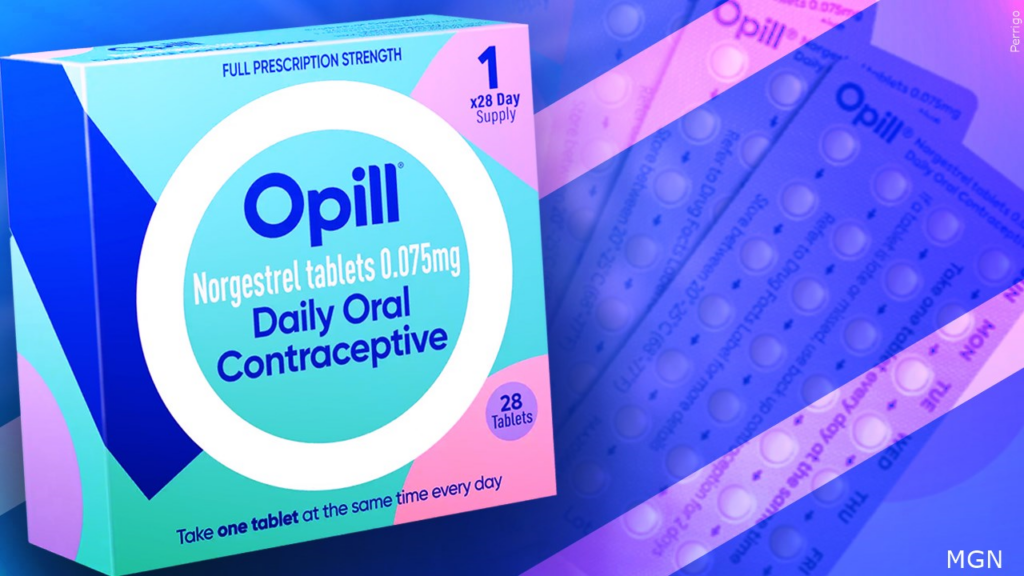The Post-Roe Era: Examining The Role Of Over-the-Counter Birth Control

Table of Contents
Increased Access and Convenience
Increased accessibility to over-the-counter birth control options could significantly improve contraceptive uptake, especially among underserved populations. Currently, many individuals face barriers to accessing prescription birth control, including financial constraints, geographical limitations (especially in rural areas with limited healthcare providers), and lack of insurance coverage. Eliminating the need for a doctor's visit reduces these barriers, making contraception more convenient and affordable.
- Reduced healthcare costs: Over-the-counter birth control eliminates doctor's visit fees, prescription costs, and potentially, transportation expenses. This is particularly important for low-income individuals and families.
- Enhanced convenience and privacy: Obtaining birth control without an appointment offers greater privacy and flexibility, allowing individuals to manage their reproductive health discreetly. This is especially crucial for individuals who may face stigma or judgment related to their sexual health.
- Improved compliance with birth control regimens: Easier access may lead to better adherence to prescribed regimens, ultimately increasing the effectiveness of contraception. Missed pills or inconsistent use are common reasons for contraceptive failure.
- Potential for wider adoption among marginalized communities: Over-the-counter availability could significantly improve access for marginalized communities, including those in rural areas, low-income communities, and communities of color, who often experience disproportionately lower rates of contraceptive use. This increased access would promote reproductive justice and health equity.
Potential Impact on Unintended Pregnancies and Abortions
Wider access to over-the-counter birth control could lead to a significant decrease in unintended pregnancies and subsequent abortions. This is a direct consequence of increased contraceptive use; studies consistently show a strong correlation between greater access to contraception and lower abortion rates. By empowering individuals to prevent unintended pregnancies, we can significantly reduce the need for abortion services.
- Reduced strain on healthcare systems: Fewer unintended pregnancies would lessen the burden on healthcare systems by reducing the need for prenatal care, delivery services, and postnatal care associated with unintended pregnancies.
- Lower social and economic costs associated with unintended pregnancies: Unintended pregnancies often lead to significant financial and social challenges for individuals and families. Reduced unintended pregnancies would alleviate these burdens.
- Empowering individuals to make informed decisions about their reproductive health: Easy access to birth control allows individuals to take control of their reproductive lives, enabling them to make informed choices aligned with their personal goals and values.
- Addressing disparities in access to reproductive healthcare: Over-the-counter birth control can help bridge the gap in access to reproductive healthcare for underserved communities, thereby promoting health equity.
Concerns and Challenges
While the benefits of over-the-counter birth control are substantial, potential concerns must be addressed. The most significant is the potential for misuse or incorrect usage of these methods. This risk underscores the critical need for comprehensive education and clear labeling to ensure safe and effective use.
- Importance of public health campaigns on proper usage: Public awareness campaigns are essential to educate individuals about proper usage, potential side effects, and interactions with other medications. These campaigns need to be accessible and culturally sensitive to reach diverse populations.
- Ensuring access to accurate information about different birth control methods: Providing clear, accurate, and unbiased information about various birth control methods is crucial to empowering individuals to make informed decisions about which method best suits their needs and lifestyle.
- Addressing potential misinformation and promoting responsible use: Combating misinformation and promoting responsible use through trusted sources is vital to prevent unintended consequences. This includes debunking myths and providing evidence-based information.
- The need for ongoing research on the effectiveness of over-the-counter birth control: Continued research is crucial to assess the long-term effectiveness and safety of over-the-counter birth control methods, while monitoring potential adverse effects and refining usage guidelines.
The Role of Government Regulation and Policy
Government regulations play a crucial role in ensuring both the safety and accessibility of over-the-counter birth control. Striking the right balance between ensuring safe access and avoiding overly restrictive regulations is essential to prevent unintended consequences.
- Careful review and approval processes for new over-the-counter birth control options: Rigorous testing and approval processes are necessary to guarantee the safety and efficacy of over-the-counter birth control options before they are made available to the public.
- Clear guidelines for labeling and advertising to prevent misinformation: Clear and accurate labeling is essential to prevent misunderstandings and promote responsible use. Regulations regarding advertising should ensure accurate and truthful information is presented to consumers.
- Public funding to support education and access initiatives: Government funding for public health campaigns and initiatives to improve access to information and affordable birth control is critical to ensuring that the benefits of over-the-counter birth control are realized by all.
Conclusion
The post-Roe landscape highlights the critical role of over-the-counter birth control in ensuring reproductive autonomy and reducing unintended pregnancies. While challenges regarding proper usage and education exist, the potential benefits of increased access to over-the-counter birth control—including reduced unintended pregnancies and abortions, and improved overall reproductive health—are substantial. Further research, comprehensive education campaigns, and thoughtful policy decisions are crucial to harnessing the full potential of over-the-counter birth control and empowering individuals to make informed choices about their reproductive health. To learn more about accessing and using over-the-counter birth control safely and effectively, consult your doctor or visit reputable online resources. Consider the impact of readily available over-the-counter birth control on your own reproductive health and well-being.

Featured Posts
-
 L Autruche De Mask Singer 2025 Indices Et Revelations
May 11, 2025
L Autruche De Mask Singer 2025 Indices Et Revelations
May 11, 2025 -
 Next James Bond Jeff Bezos Fan Poll Reveals A Clear Favorite
May 11, 2025
Next James Bond Jeff Bezos Fan Poll Reveals A Clear Favorite
May 11, 2025 -
 The Adam Sandler Effect Hope For Healing In A Fractured America
May 11, 2025
The Adam Sandler Effect Hope For Healing In A Fractured America
May 11, 2025 -
 Moscows Victory Day Parade A Showcase Of Russias Armed Forces Under Putin
May 11, 2025
Moscows Victory Day Parade A Showcase Of Russias Armed Forces Under Putin
May 11, 2025 -
 Yankees Giants Series Examining The Injured Lists April 11 13
May 11, 2025
Yankees Giants Series Examining The Injured Lists April 11 13
May 11, 2025
